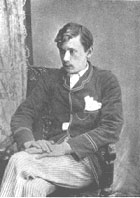Non Sum Qualis Eram Bonae Sub Regno Cynarae Poem by Ernest Christopher Dowson
Non Sum Qualis Eram Bonae Sub Regno Cynarae
Last night, ah, yesternight, betwixt her lips and mine
There fell thy shadow, Cynara! thy breath was shed
Upon my soul between the kisses and the wine;
And I was desolate and sick of an old passion,
Yea, I was desolate and bowed my head:
I have been faithful to thee, Cynara! in my fashion.
All night upon mine heart I felt her warm heart beat,
Night-long within mine arms in love and sleep she lay;
Surely the kisses of her bought red mouth were sweet;
But I was desolate and sick of an old passion,
When I awoke and found the dawn was gray:
I have been faithful to thee, Cynara! in my fashion.
I have forgot much, Cynara! gone with the wind,
Flung roses, roses riotously with the throng,
Dancing, to put thy pale, lost lilies out of mind;
But I was desolate and sick of an old passion,
Yea, all the time, because the dance was long:
I have been faithful to thee, Cynara! in my fashion.
I cried for madder music and for stronger wine,
But when the feast is finished and the lamps expire,
Then falls thy shadow, Cynara! the night is thine;
And I am desolate and sick of an old passion,
Yea, hungry for the lips of my desire:
I have been faithful to thee, Cynara! in my fashion.
I read somewhere that the poet had spent the night with a prostitute, trying to drown his desire for Adelaide. I believe he is talking about two different women here - well, one child and a woman. I believe that cynara refers to a sunflower (it's in the sunflower family) - which certainly could be the young child - contrasted with the 'bought red mouth' of the prostitute. If he were trying to believe that he was spending the night with Adelaide and using the prostitute for his delusions, the poem makes complete sense to me. Add some absinthe and you have the recipe for disaster - his very sad life full of unrequited love - the very essence of romance.
Cynara is first of all the proper name for the Globe artichoke, but we can assume Dowson wasn't calling his love a thistle. Wikipedia has this to say, 'In 1889, Dowson fell in love with eleven-year-old Adelaide 'Missie' Foltinowicz, the daughter of a Polish restaurant owner. Adelaide is reputed to be the subject of one his best-known poems, Non Sum Qualis eram Bonae Sub Regno Cynarae' Eleven? You did sat a 'decadent soul'
Who or what is Cynara? I knew it was a reference to one of Horace's odes, but that did not provide the key. If you look at the line 'Dancing, to put thy pale, lost lilies out of mind' it becomes clear Cynara is death, greeted and embraced by one who has indulged in frantic pleasures in order to forget the ultimate reality. (Larkin's 'Aubade' is a more intellectual resonse to the same stimulus) . Dowson's images and music never fail to take my breath away. This is the cry of a decadent soul, who seems, through excess, to have achieved at least some measure of understanding and acceptance.
My introduction to this poem and thus to Dowson came from the movie 'Laura.' At one point in the film an aging but fashionable radio personality (played by Clifton Webb) reads this poem on the air. The plot was convoluted but the poem stayed in my memory as romantic sophistication at the highest level. Now many years later it doesn't move me in the same way. The Association of American Poets has a link on its website to Poetry and the Movies with another link to W.H. Auden's 'Funeral Blues' ftom Four Weddings and a Funeral, plus three other films. Cynara, alas, didn't make the cut.
This poem has not been translated into any other language yet.
I would like to translate this poem
I abandon the history of the poet and interpret this as a personal missive. I have always found the poignancy and sadness in this poem highly personal. For me it is about settling for second best, for being mislead in one's heart and having to admit folly. This is about the foolish things we do in grief, the wrongness and worldly beliefs we have that cause us greater pain in the falsity of our self-solace. It is indeed a decadent thing - the search for physical comfort in a material world when it is our spirits that ache.